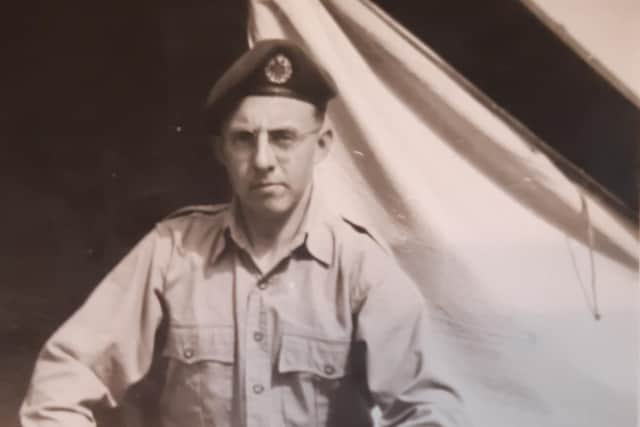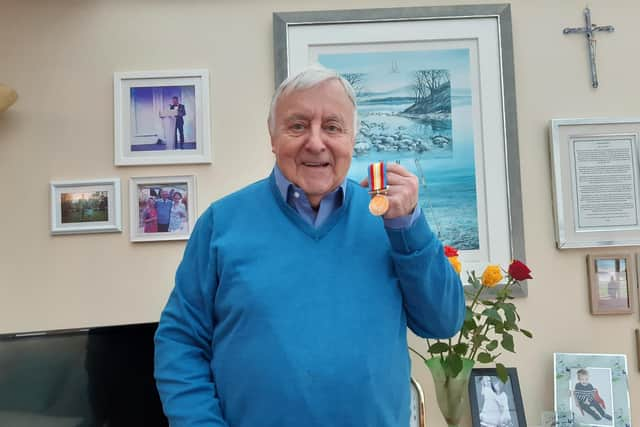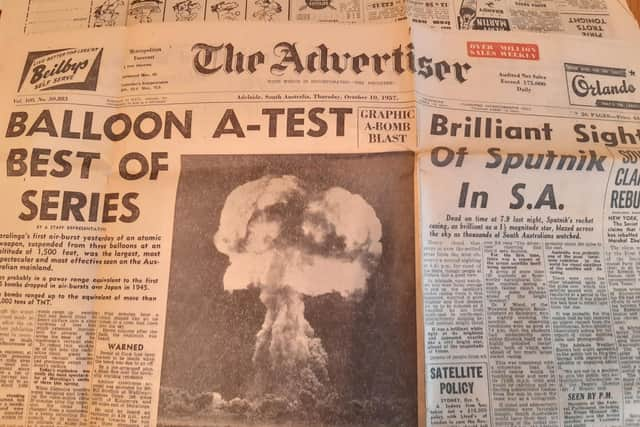Harrogate man, 85, who risked his life in Britain's atom bomb test in 1957 is finally recognised
and live on Freeview channel 276
Proud RAF veteran John Walden, who is now aged 85, said it was only in recent weeks that he had realised he was going to be recognised by receiving The Nuclear Test Medal from the Ministry of Defence for the risks he undertook in the heat of the Australian desert at the height of the Cold War.
“It’s a nice medal,” said John.
"But when I was told I was going to receive it, all I thought was “at long last”.


Advertisement
Hide AdAdvertisement
Hide Ad"I’m proud of my service to this country but I’ve only waited for 66 years.
"So many of my former colleagues aren’t around now to receive it.”
Mr Walden, who lives at Wentworth Drive in Harrogate, was serving as a corporal in the Royal Air Force and just 19-years-old when he was seconded to the UK Atomic Energy Authority in 1957.
Soon he was being sent 10,000 miles to Australia via USA and Hawaii to participate in the UK atomic tests in 1957.


Advertisement
Hide AdAdvertisement
Hide AdHis role in this hush-hush operation was to prepare the bomb to be lifted 1,000ft by giant balloon into the air over the sands of Maralinga in the remote western area of Australia.
There was little thought of the impact of contamination from potentially fatal radiation for John or the rest of the team when the atom bomb was detonated.
"We didn’t really know what we were doing,” John remembers.
"We weren’t given any protective clothing and we weren’t taken that far away from the test site, perhaps a couple of miles.”


The impact of the detonation was instantaneous and shocking.
"We were told to turn round and cover our eyes,” he said.
Advertisement
Hide AdAdvertisement
Hide Ad"When the atom bomb went off, the light was so bright, you could see the bones of your fingers like an X-ray.
"Then you felt the blast of the wind come rushing through you."
After leaving the military in the 1960s, John has led a life less ordinary.
Since 1969, the Revd John Walden as he should be called, properly, has been a vicar serving with several churches, a managing director of three commercial companies and a world-wide authority on stamps, in particular, stamps related to nuclear tests, of which there are many more than you might imagine.
Advertisement
Hide AdAdvertisement
Hide AdThere are no regrets but neither has this international lecturer, published author, former minister on cruise ships and director of The Association of British Philatelic Societies turned his back on the past or forgotten the danger so many went through in service to their country.
A member of the British Nuclear Test Veterans Association, this personable and versatile veteran was even editor of the charity’s magazine Campaign in the 1990s.
Over the decades, John has been a key figure in the battle to win compensation and/or recognition for all those who involved in the series of British nuclear tests in Australia between 1952 and 1963.
Although not an opponent of the nuclear deterrent, John has seen up close the way British Governments of all political stripes have handled the situation.
Advertisement
Hide AdAdvertisement
Hide Ad"We all put our lives and our health on the line for the country, thousands of us,” he said.
"I’ve been to Westminster. I’ve met the right people.
"But, in practice, all the government has done is prevaricate and keep changing the goal posts for compensation no matter who has been in charge.
“The campaign for nuclear test vets has been supported by individual MPs over the years but that was it until the new medal.”
The long battle found some sense of resolution last November when Prime Minister Rishi Sunak announced the dwindling band of atom bomb tests veterans were to be recognised with the medal.
Advertisement
Hide AdAdvertisement
Hide AdWith the agreement of the Australian Government, Britain tested atomic weapons at three sites on Australian territory from 1952 to 1963: the Montebello Islands off Western Australia, and Emu Field and, most often, Maralinga, where John was sent.
In a way, this resilient Harrogate veteran is one of the lucky ones.
Despite getting a dose of radiation during those fateful days on the other side of the world 66 years ago it was a low one compared to some.
He knows of colleagues who were to die later.
But this very resilient man who moved to Harrogate from Norwich in 2013 as a widower to marry Harrogate woman Alison is not someone to fall into bitterness or nurse regret for long.
Advertisement
Hide AdAdvertisement
Hide AdA teenager at the time of these momentous events, the motivation had been adventure, he says.
"I volunteered to be sent to the nuclear tests.
"There was a notice on a board saying they wanted volunteers.
"I’d signed up for the RAF before I could be called up for my National Service because I thought that way I would get to see the world.
"We were flown across the world on out way to the nuclear test in Australia.
Advertisement
Hide AdAdvertisement
Hide Ad"There were stopovers in San Francisco and Honolulu in Hawaii.
"I treated the whole thing as one big, glorious holiday.
"I didn’t really understand was going on.
"When we were setting up the bomb prior to detonation, I and about about half a dozen of the crew signed our names on it.
"There’s not many people who have signed their name on an atom bomb.”